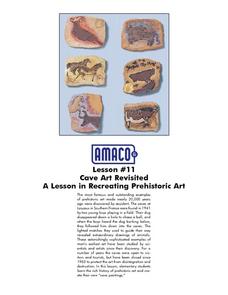Curated OER
Cave Art Revisited
Students research the sources of prehistoric cave paintings and engage in an activity of creating their own cave art. The lesson focuses on the design, composition style of the art, and importance of cultural contributions cave painting...
Khan Academy
Khan Academy: A Brief History of Western Culture
History is divided into time periods in order to better understand the culture and characteristics of that time. Read a brief description of the art and culture of historical time periods in this introductory article.
Khan Academy
Khan Academy: Origins of Rock Art in Africa
Personal ornamentation and engraved designs are the earliest evidence of art in Africa and are inextricably tied up with the development of human cognition. View pictures and read about prehistoric art in Africa.
Khan Academy
Khan Academy: Rock Art in North Africa
Algeria hosts a rich rock art concentration. The most renowned of all these areas is the Tassili n'Ajjer described as "forests of stone". View pictures and read a brief history of rock art in Africa.
Khan Academy
Khan Academy: Apollo 11 Stones
The Apollo 11 Stones remain the oldest examples of figurative art from the African continent. Their discovery contributes to our conception of early humanity's creative attempts, before the invention of formal writing, to express their...
Khan Academy
Khan Academy: Running Horned Woman, Tassili N'ajjer
Who was the Running Horned Woman? For so long the search for meaning in rock art was considered impossible-only recently have scholars endeavored to move beyond the mere description of images and styles using a variety of...
Khan Academy
Khan Academy: Key Points for Studying Global Prehistory
This is a handy study guide for key points about prehistoric times, specifically art during this period. Includes definitions and a specific details about each continent during this period.
Khan Academy
Khan Academy: Camelid Sacrum in the Shape of a Canine
This fascinating and unique prehistoric sculpture of a dog-like animal was discovered accidentally in 1870 in Tequixquiac, Mexicocan. Anthropologists are not certain of this object's original meaning for either the artist or the people...
Khan Academy
Khan Academy: Terracotta Fragments, Lapita People
Archaeologists get very excited when they find pieces of Lapita pottery. Why? Because the sequential depositing of potsherds (fragments of pottery) in an easterly direction across the island groups of the Pacific has become the pivotal...
Khan Academy
Khan Academy: Ambum Stone
The Ambum Stone is prized above all others not only for its age-it is one of the oldest of all sculptures made in Oceania-but also for its highly detailed sculptural qualities. View pictures and read about the history and mysteries...











